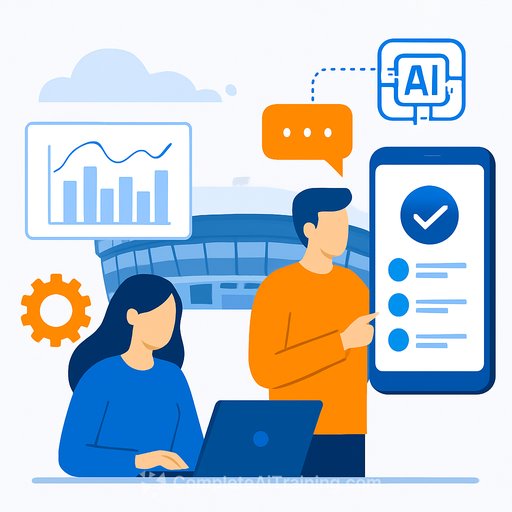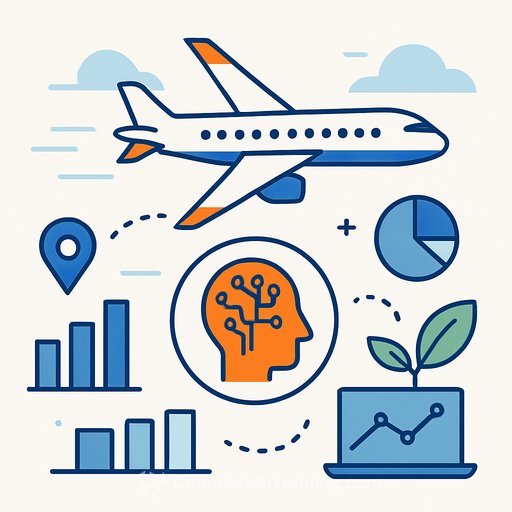AI adoption remains low as roles and timelines shift in ANZ events
A new survey of 319 corporate planners and 131 venues across Australia and New Zealand shows a clear pattern: AI is barely being used, booking windows are short, and more non-event roles are shouldering event work.
The data, collected in September-October 2025, cuts across professional services, healthcare, education, finance, government, hospitality, and more. The signal is consistent: time pressure is up, costs are tight, and the industry is leaving easy efficiency gains on the table.
AI: interest is high, usage is not
91% of venues are not using AI to handle enquiries. On the corporate side, 53% aren't using AI to find, organise, or manage events.
Time cost remains heavy. 71% of corporate respondents spend more than five hours sourcing and booking a venue per event. Breakdown: 44% spend 5-10 hours, 19% spend 10-20 hours, and 8% spend more than 20 hours.
As VenueNow CEO Jake Dimarco put it: "In the business world, AI is no longer the monster under the bed. It's the trusty sidekick that complements your daily tasks and makes your life a lot easier."
Dimarco pointed to straightforward use cases: build event checklists, find and shortlist venues, compare quotes, and support negotiation with venues and suppliers. He also noted that digital-first professionals expect tools that reduce repetitive work and speed up decisions.
Who is actually planning events now
Event responsibility has moved beyond traditional titles. The largest group of planners in the survey were executive and personal assistants (32%), followed by event coordinators and managers (31%), marketing professionals (15%), and senior leaders such as CEOs, directors, and GMs (10%).
Translation: busy people with many priorities are running point. Tools and processes must be simple, fast, and easy to hand off.
Shorter lead times, smaller and more frequent gatherings
Three-quarters of events are booked within six months of the date. 44% are confirmed 3-6 months out, and 31% lock in with less than three months' notice. That requires sharper decision-making and faster supplier responses.
59% of organisers report a shift to more frequent, smaller meetings and conferences. Agility beats scale right now.
Where the friction sits
- Cost pressure (planners): 52% say budget is the number one constraint.
- Venue availability (planners): 22% perceive a lack of suitable options.
- Price sensitivity (venues): 54% see tighter customer budgets as the main challenge.
- Fewer enquiries (venues): 42% report a drop in inbound leads.
Practical playbook: save 5-10 hours per event
- Smart intake: Use a single enquiry form that captures date ranges, headcount bands, budget ranges, and must-haves. Auto-tag and route by event type and urgency.
- AI triage: Auto-reply with key clarifying questions, propose two to three viable dates, and request a budget band if missing.
- RFP in one click: Standardise your RFP template. Use an AI tool to fill in details from the intake and your event playbook.
- Shortlist scoring: Keep a venue matrix (capacity, packages, AV, access, outdoor, parking, dietary). Auto-score matches and send holds to the top three.
- Quote comparison: Normalise line items (room hire, F&B, AV, service fees, add-ons). Auto-highlight deltas and likely hidden costs.
- Negotiation prompts: Prep a simple script: date flexibility, F&B minimums, package swaps, add-value over discount (e.g., early access, upgraded AV, extra breakout).
- Calendar and CRM sync: Auto-create holds, tasks, and approval steps. Track stage changes and response times.
- Supplier micro-database: Keep updated contacts, packages, blackout dates, and feedback notes after each event.
KPIs worth tracking
- Hours to source and book (target: down month over month).
- First-response time to enquiries (target: under two hours during business hours).
- Shortlist-to-confirmed conversion by event type and size.
- Lead time mix (under 3 months, 3-6 months, 6+ months).
- Cost per attendee vs. satisfaction score or NPS.
Quick start with AI (no jargon, no big rollout)
- Pick one workflow: enquiry triage or quote comparison. Implement that first.
- Use tools you already have: email, a shared spreadsheet, and a general AI assistant.
- Create three reusable prompts: intake clarifier, RFP builder, quote normaliser.
- Pilot with two suppliers who reply fast. Iterate for two weeks, then expand.
- Document the steps in a one-page SOP anyone on the team can run.
If you want a structured path to upskill your team, see curated AI learning by role here: Complete AI Training - Courses by Job.
For venues: win the short-window business
- AI-assisted enquiry handling: Auto-acknowledge, ask two clarifiers, propose two date options, and attach a starter package within minutes.
- Package clarity: Publish three price-transparent bundles (small, mid, large) with inclusions and common add-ons.
- Fast holds policy: Offer 48-72 hour soft holds with clear expiry. Planners need certainty quickly.
- Quote comparison friendly: Provide clean line items and a one-paragraph summary of value adds.
- Content that answers questions: Access, load-in times, AV specs, floor plans, insurance, dietary flow - one link, always current.
Bottom line
Most teams are still doing this the hard way. The data shows tight timelines, more events, and wider roles - which is exactly where simple AI-assisted workflows shine.
Start small, ship one improvement, and bank the hours you save. The teams who move first will book faster and win more short-notice events while everyone else is still stuck in email chains.
Your membership also unlocks:






